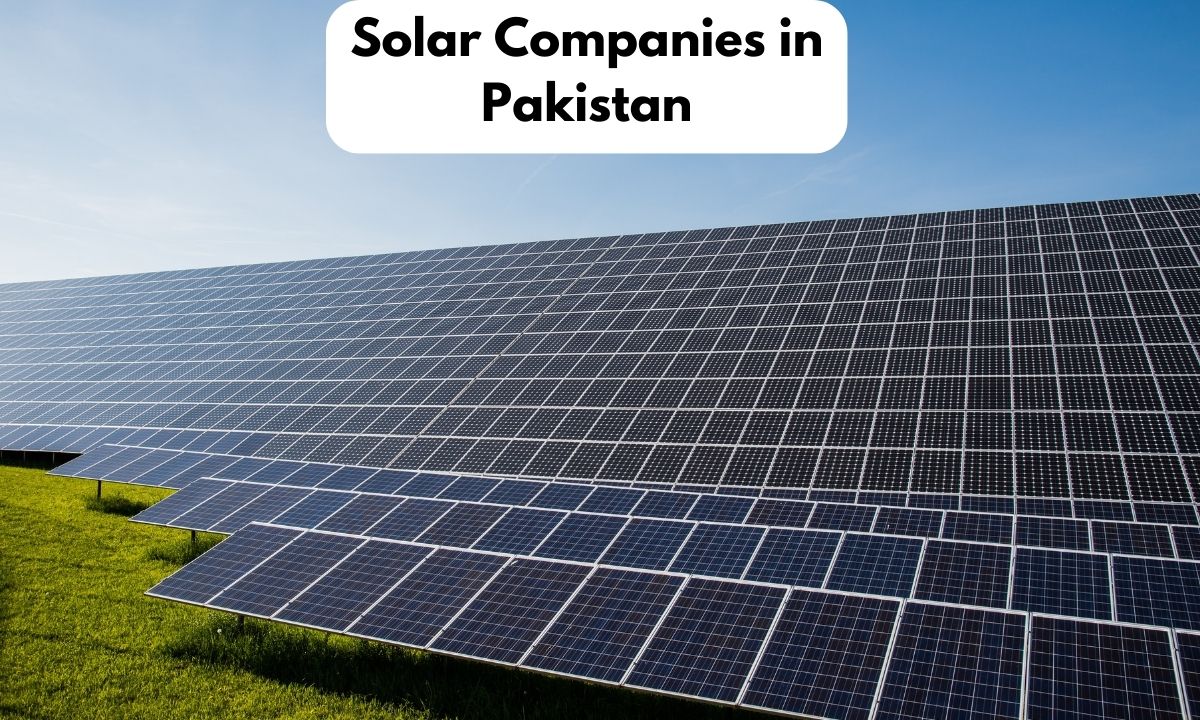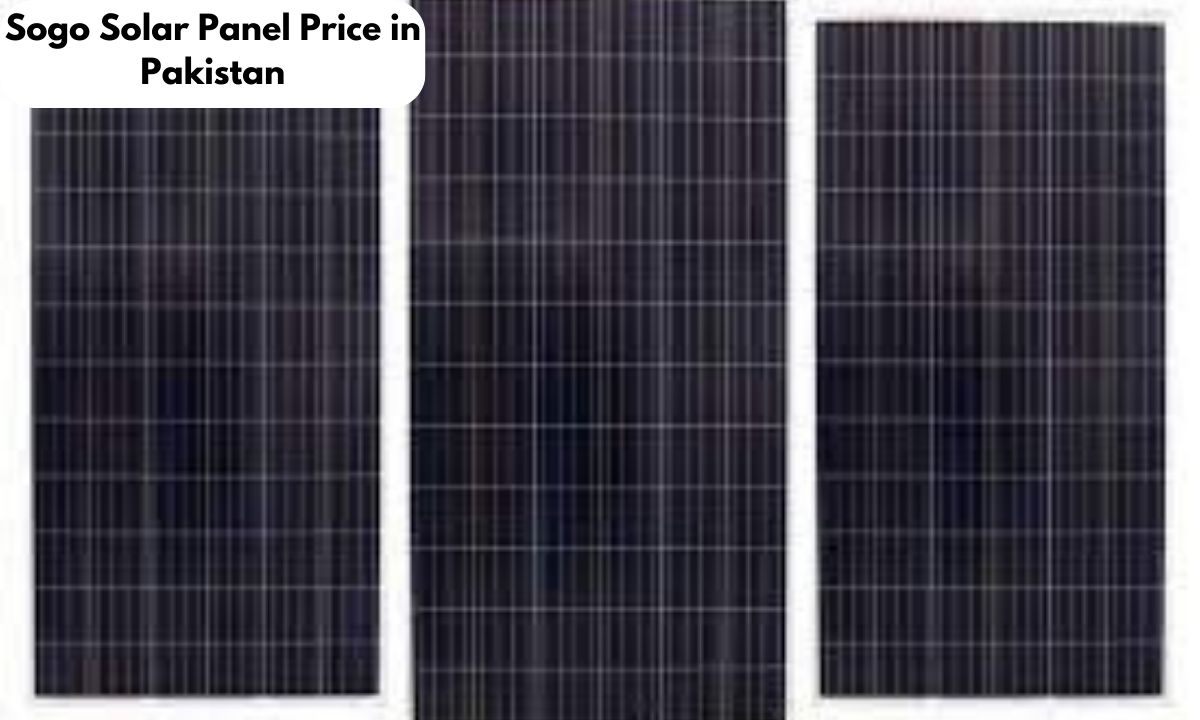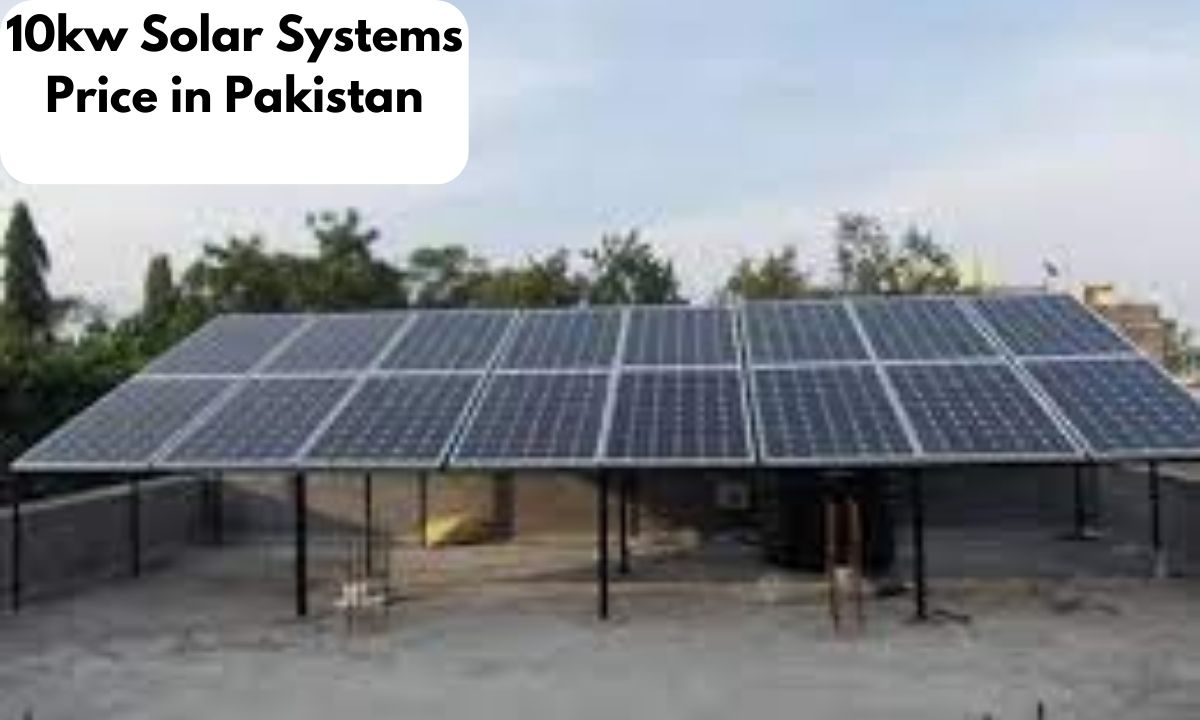Solar Companies in Pakistan (Latest Guide)
In sunny Pakistan, we’re tapping into the power of the sun to generate electricity. By using only a tiny fraction (0.071%) of our land for solar power, we can actually meet the country’s electricity needs. Experts predict that in the next five years, the solar energy market here will grow significantly, reaching a whopping 9.77 gigawatts.
This growth is thanks to government initiatives like the National Solar Energy Initiative and the involvement of leading solar companies such as Safeway Renewable Energy, Premier Energy, SkyElectric, and Pantera Energy. It’s not just about power; it’s about taking steps to reduce our carbon footprint and tackle climate change. Solar energy is becoming a crucial ally in these efforts.

Top Solar Companies in Pakistan
Let’s take a quick look at the key players in the solar energy scene in Pakistan:
- Alpha Solar: With 7 years of experience, Alpha Solar specializes in creating ground-mounted solar farms and large-scale solar systems, having successfully brought over 193 MW of renewable energy projects to life.
- Sympl Energy: Renowned for its comprehensive design and installation services catering to residential, commercial, and industrial clients. They’ve completed over 1000 projects throughout Pakistan.
- Premier Energy: A top player in steam technology and services, Premier Energy stands out for applying its expertise in high-pressure boilers and steam generation to develop cutting-edge Enhanced Oil Recovery (EOR) steamflood generators.
- Pantera Energy: Unfortunately, detailed information about Pantera Energy’s services and contributions to the solar industry in Pakistan is not readily available in search results.
- Reon Energy: Similar to Pantera Energy, specific details about Reon Energy’s services and contributions to the solar industry in Pakistan are not readily available in search results.
- Pak Solar: Similarly, information about Pak Solar’s services and contributions to the solar industry in Pakistan is not easily found in search results.
- Buysolar: Like the others, specific details about Buysolar’s services and contributions to the solar industry in Pakistan are not available in the search results.
- Sky Electric: Offering a free consultation service to help determine energy needs and find the most suitable solar solutions.
- Fb Energy: Unfortunately, specific details about Fb Energy’s services and contributions to the solar industry in Pakistan are not available in search results.
- City Solar: Similarly, information about City Solar’s services and contributions to the solar industry in Pakistan is not easily found in search results.
- Zi Solar: Like the others, specific details about Zi Solar’s services and contributions to the solar industry in Pakistan are not available in the search results.
Each company plays a unique role in advancing solar solutions in Pakistan, with expertise ranging from large-scale installations to specialized technologies. While some companies have detailed information available, others maintain a lower profile in online searches.
Achievements and Contributions of These Companies to the Solar Industry in Pakistan
Alpha Solar: Alpha Solar has played a vital role in assisting numerous businesses and industries in Pakistan to make the switch to solar solutions. Their services range from free consultations to on-site surveys, offering top-notch solar panels, inverters, and batteries. They even provide financing options, including interest-free EMI plans. Specializing in on-grid, off-grid, and hybrid solar solutions, Alpha Solar ensures an efficient net metering process.
Sympl Energy: With over 1000 residential and commercial projects across Pakistan, Sympl Energy stands out. They tailor solar solutions to meet the specific needs of their clients, emphasizing cost-effectiveness and environmental friendliness. Their initiatives contribute to reducing Pakistan’s carbon footprint and addressing climate change concerns.
Premier Energy: Rapidly growing, Premier Energy is a key player in Pakistan’s solar industry. They offer economical solar solutions for residential, commercial, industrial, and agricultural sectors. Having completed numerous projects in these sectors, Premier Energy has significantly boosted the adoption of solar energy in Pakistan. They’ve also assisted various Pakistani textile brands in acquiring tailored solar systems.
Sky Electric: Transforming the solar energy landscape in Pakistan, Sky Electric introduces smart solar solutions. Their cutting-edge technology integrates solar panels, energy storage, and energy management systems. Sky Electric’s vision is to make clean and affordable energy the standard in Pakistan, contributing to overcoming the country’s energy challenges.
These companies have made notable contributions to advancing renewable energy, offering innovative solutions, and shaping Pakistan’s energy landscape. Their pivotal role in steering the country toward a more sustainable and greener future is reflected in making solar energy accessible and affordable for everyone.
Solar Power Plants and Large-Scale Projects
In Pakistan’s energy landscape, solar power stands out as a game-changer. Struggling with energy shortages and heavily dependent on fossil fuels, the adoption of renewable energy, particularly solar, emerges as a sustainable solution to address the nation’s power needs. Notably, there’s been a significant surge in solar capacity, spanning both large-scale projects and decentralized systems.
Major Solar Power Players and Their Capacities
- Quaid-e-Azam Solar Park: Situated in Bahawalpur, Punjab, this photovoltaic power station is a colossal 400 MW facility spread across 8 km², adorned with 1.6 million solar modules. It proudly claims the title of Pakistan’s first-ever utility-scale solar power plant.
- Appolo Solar Development: Nestled in Bahawalpur, Punjab, this solar power plant boasts a capacity of 100 MW.
- Saleh Pat Solar PV Park: A prospective 50 MW solar PV power project in Sindh, Pakistan, gearing up for construction in 2024 and anticipated commercial operation by 2025.
Upcoming Ventures in Sindh and Kasur
The Sindh government seeks World Bank support for the development of two solar parks in the province, aiming to generate a substantial 890 megawatts of clean electricity. Additionally, plans are underway for the establishment of the inaugural ‘400 MW Solar Power Park in District Jamshoro under the World Bank-backed ‘Sindh Solar Energy Project (SSEP)’ through competitive auctions.
Government’s Vision for Future Solar Power Integration
Pakistan’s government has set ambitious targets, aiming to elevate variable renewable energy to 20 percent of its electricity mix by 2025 and a bold 30 percent by 2030. Realizing these goals necessitates a rapid and extensive expansion of solar and wind through competitive bidding. Over the last five years, six solar power projects totaling 430 MW have successfully commenced operations, contributing significantly to Pakistan’s electricity supply.
Economic and Environmental Impact of Solar Energy in Pakistan
The Cost-Effective Marvel of Solar Energy for Individuals and Businesses
Solar energy is gaining popularity in Pakistan for being a budget-friendly solution for both homes and businesses. For businesses, solar panels can significantly cut down energy costs by producing a substantial amount of electricity.
The Pakistani government sweetens the deal by offering financial perks like tax credits, exemptions, and net metering to help offset the installation expenses, making solar power an even more affordable choice.
Residential areas can also enjoy reduced utility bills thanks to solar energy. Additionally, the decreasing costs of solar panels and technological advancements are making solar energy more accessible to everyone.
Environmental Perks of Making the Solar Switch
Embracing solar power brings about numerous environmental advantages. Solar energy is clean and renewable, emitting no carbon, unlike fossil fuels. By harnessing solar power, Pakistan can lessen its reliance on fossil fuels, take a stand against climate change, and create a cleaner, healthier environment for its citizens. Solar energy also plays a role in reducing air pollution since the combustion of fossil fuels is a major contributor to air pollution, releasing sulfur, nitrogen oxides, and particulate matter.
Solar Energy’s Impact on Pakistan’s Energy Independence
Unlocking its solar potential allows Pakistan to cut back on importing fossil fuels, a significant economic burden. Solar power helps stabilize the national grid by providing extra power during high-demand periods, reducing the risk of blackouts.
The shift to solar energy can also jumpstart economic growth by creating jobs in the renewable energy sector. The Pakistani government envisions deriving 60 percent of its energy from renewable sources, including hydro, by 2030, showcasing the pivotal role solar energy is set to play in the country’s future energy mix.
Challenges and Opportunities in Pakistan’s Solar Industry
Hurdles and Hope
Solar companies in Pakistan grapple with various challenges, notably a scarcity of crucial infrastructure like transmission lines, substations, and grid connections. This scarcity hinders the sector’s growth.
Additionally, a lack of investments, partially stemming from political instability, creates uncertainty, making it tough to attract long-term funding and execute plans. A shortage of technical expertise is another hurdle, emphasizing the need for skilled professionals capable of installing and maintaining solar energy systems.
Potential for Expansion in Homes and Businesses
Despite these challenges, promising growth opportunities exist in both residential and commercial sectors. The decreasing costs of solar panels and evolving technologies are breaking barriers, making solar energy more accessible.
The Pakistani government actively supports renewable energy development through initiatives and policies aimed at fostering solar energy. Moreover, Pakistan’s abundant solar irradiance, receiving sunlight almost year-round, presents a golden chance to harness solar energy.
International Investments and Technological Strides
International investments, notably from China, significantly impact Pakistan’s solar industry, with Chinese companies contributing nearly 87% of total capital in solar PV plants. Technological advancements play a pivotal role in the sector’s growth.
As technology progresses and economies of scale are achieved, the costs of solar panels and installation are expected to further decrease, rendering solar energy more affordable. Ongoing research and development efforts are focused on improving the efficiency of solar panels, energy storage solutions, and grid integration, promising a brighter future for solar energy in Pakistan.
Consumer Guide to Going Solar in Pakistan
- Evaluate Your Home’s Solar Potential: Start by considering where you live, how much sunlight your area gets, and whether your roof is a good fit for solar panels.
- Determine Your Power Needs: Figure out how much electricity you use now and what you might need in the future. This helps you decide what size solar system is right for you.
- Select a Solar Installer: Get advice from trustworthy solar installation companies nearby. They can offer customized quotes and helpful information.
- Installation Process: Let the solar installer take care of the installation. They’ll put up the solar panels, connect them to an inverter, and integrate everything with your home’s electrical system.
- Apply for Net Metering: Take advantage of net metering, a system that lets you sell any extra energy your solar panels generate back to the grid. This can help cover the cost of your solar setup.
Taking these steps gets you on the path to embracing solar energy at home, making a positive impact on your electricity use and potentially saving you money in the long run.
Weighing the Pros and Cons: Costs and Benefits of Solar Installations
When it comes to residential solar panel systems in Pakistan, the price tag typically falls between PKR 75,000 and PKR 1,000,000. This cost varies based on factors like system size, equipment type, and installation charges.
On the flip side, the advantages of going solar are quite appealing, offering savings on electricity bills, a potential bump in property value, and a notable drop in greenhouse gas emissions. The benefit-to-cost ratio for solar PV systems is indeed favorable, making it an economically sound choice.
Financial Options and Government Backing for Solar Power
To make the solar dream a reality, various financing options are available in Pakistan. Consumers can either pay for their solar PV system upfront or opt for loans from banks. The State Bank of Pakistan has rolled out a policy ensuring financing accessibility for domestic, agricultural, commercial, and industrial borrowers eyeing renewable energy projects.
Some banks, like Meezan Bank, even provide interest-free solar financing solutions. Additionally, government incentives and subsidies play a crucial role in reducing the overall cost of solar installations. Staying informed about available programs and tax benefits is key.
The Solar Investment Tax Credit (ITC), a federal initiative, currently offers a 26% tax credit for systems installed between 2020-2022 and 22% for those installed in 2023. Keeping an eye on these financial aspects ensures a smoother transition to solar energy.
Future of Solar Energy in Pakistan
Looking ahead, the future of solar energy in Pakistan holds great promise. Projections indicate a robust growth rate of 49.68% in the country’s solar energy market from 2023 to 2028. As of 2022, Pakistan has already achieved a total solar installed capacity of 1.24 GW, showing a 17% increase from the previous year.
This upward trend is set to persist, with solar photovoltaic (PV) expected to contribute 12% of the total installed generation capacity by 2035.
To drive this growth, the government has taken significant steps. In September 2022, they greenlit the National Solar Energy Initiative, aiming to generate 10,000 megawatts. Furthermore, the ambitious target of sourcing 60% of energy from renewables, including solar, by 2030 is on the horizon.
The utility sector is poised to lead this expansion, thanks to the decreasing cost of solar modules and a slew of upcoming projects. Notably, more industries and businesses are embracing solar solutions, and residential adoption of rooftop photovoltaic panels is witnessing a notable uptick.
Solar Energy’s Integral Role in Pakistan’s Energy Blueprint
Solar energy stands as a linchpin in Pakistan’s long-term energy strategy. A new 25-year energy policy is in the works, aiming for 20-30% of total energy to be sourced from renewables. This policy seeks to decrease reliance on imported fuels and increase the share of renewable energy in the national energy mix.
The government, through the Alternative Energy Development Board, plans to establish solar-generating facilities across the country, strategically identifying locations for larger renewable energy projects. Embracing solar power not only helps stabilize the national grid during peak demand but also mitigates the risk of blackouts.
Beyond these benefits, the widespread adoption of solar energy is anticipated to open up new job opportunities in the installation, maintenance, and manufacturing sectors, contributing to both energy sustainability and economic growth.





